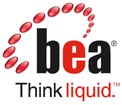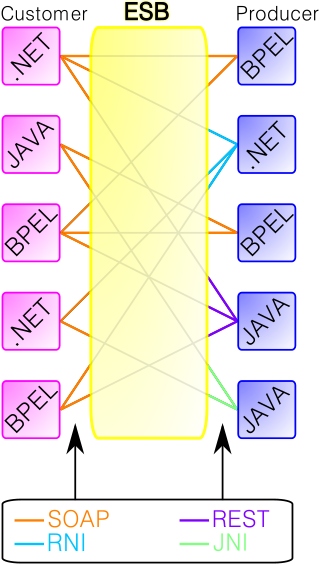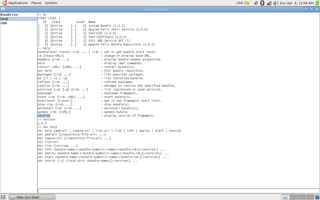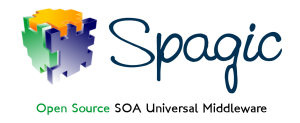
OSGi is an open specification and open source project under the Eclipse Foundation. It is a continuation of the work done by the OSGi Alliance, which was an open standards organization for computer software founded in March 1999. The foundation originally specified and maintained the OSGi standard. The alliance transferred its work to the Eclipse Foundation at the end of 2020. The OSGi specification describes a modular system and a service platform for the Java programming language that implements a complete and dynamic component model, something that does not exist in standalone Java or VM environments. It has a service-oriented architecture based on micro services each implemented as an extended Java class file archive.
The Jakarta Messaging API is a Java application programming interface (API) for message-oriented middleware. It provides generic messaging models, able to handle the producer–consumer problem, that can be used to facilitate the sending and receiving of messages between software systems. Jakarta Messaging is a part of Jakarta EE and was originally defined by a specification developed at Sun Microsystems before being guided by the Java Community Process.
Middleware in the context of distributed applications is software that provides services beyond those provided by the operating system to enable the various components of a distributed system to communicate and manage data. Middleware supports and simplifies complex distributed applications. It includes web servers, application servers, messaging and similar tools that support application development and delivery. Middleware is especially integral to modern information technology based on XML, SOAP, Web services, and service-oriented architecture.

BEA Systems, Inc. was a company that specialized in enterprise infrastructure software products, which was wholly acquired by Oracle Corporation on April 29, 2008.

An enterprise service bus (ESB) implements a communication system between mutually interacting software applications in a service-oriented architecture (SOA). It represents a software architecture for distributed computing, and is a special variant of the more general client-server model, wherein any application may behave as server or client. ESB promotes agility and flexibility with regard to high-level protocol communication between applications. Its primary use is in enterprise application integration (EAI) of heterogeneous and complex service landscapes.
Java Business Integration (JBI) is a specification developed under the Java Community Process (JCP) for an approach to implementing a service-oriented architecture (SOA). The JCP reference is JSR 208 for JBI 1.0 and JSR 312 for JBI 2.0. JSR 312 was removed from the JCP balloting process on 17 Dec, 2010 by the submitters without being accepted.

IONA Technologies was an Irish software company founded in 1991. It began as a campus company linked to Trinity College Dublin had its headquarters in Dublin, and eventually also expanded its offices in Boston and Tokyo. It specialised in distributed service-oriented architecture (SOA) technology, its products connecting systems and applications by creating a network of services without requiring a centralised server or creating an information technology project. IONA was the first Irish company to float on the NASDAQ exchange. It was valued at up to US$1.75 billion at its peak. It was one of the world's 10 largest software-only companies, and around 30 new ventures spun out from it. IONA was sold to Progress Software in 2008.
Apache ServiceMix is an open-source software project to implement a distributed enterprise service bus (ESB).
Fractal is a modular and extensible component model that can be used with various programming languages to design, implement, deploy and reconfigure various systems and applications, from operating systems to middleware platforms and to graphical user interfaces. The goal of Fractal is to reduce the development, deployment and maintenance costs of software systems in general, and of OW2 projects in particular. The Fractal model already uses some well known design patterns, such as separation of interface and implementation and, more generally, separation of concerns, in order to achieve this goal. There is also ongoing research work to get even closer to this goal. Fractal is hosted and developed by the OW2 consortium. It is distributed under the LGPL open-source license.
OpenESB is a Java-based open-source enterprise service bus. It can be used as a platform for both enterprise application integration and service-oriented architecture. OpenESB allows developers to integrate legacy systems, external and internal partners and new development in business processes. It supports a multitude of integration technologies including standard JBI, XML with support for XML Schemas, WSDL, and BPEL with the aim of simplicity, efficiency, long-term durability, and low TCO.
Service-oriented architectures (SOA) are based on the notion of software services, which are high-level software components that include web services. Implementation of an SOA requires tools as well as run-time infrastructure software. This is collectively referred to as a service-oriented architecture implementation framework or (SOAIF). The SOAIF envisions a comprehensive framework that provides all the technology that an enterprise might need to build and run an SOA. An SOAIF includes both design-time and run-time capabilities as well as all the software functionality an enterprise needs to build and operate an SOA, including service-oriented:

Apache Felix is an open source implementation of the OSGi Core Release 6 framework specification. The initial codebase was donated from the Oscar project at ObjectWeb. The developers worked on Felix for a full year and have made various improvements while retaining the original footprint and performance. On June 21, 2007, the project graduated from incubation as a top level project and is considered the smallest size software at Apache Software Foundation.
Apache Camel is an open source framework for message-oriented middleware with a rule-based routing and mediation engine that provides a Java object-based implementation of the Enterprise Integration Patterns using an application programming interface to configure routing and mediation rules.
Red Hat Fuse is an open source integration platform based on Apache Camel. It is a distributed integration platform that provides a standardized methodology, infrastructure, and tools to integrate services, microservices, and application components.
Service Component Architecture (SCA) is a software technology designed to provide a model for applications that follow service-oriented architecture principles. The technology, created by major software vendors, including IBM, Oracle Corporation and TIBCO Software, encompasses a wide range of technologies and as such is specified in independent specifications to maintain programming language and application environment neutrality. Many times it uses an enterprise service bus (ESB).
JBoss Developer Studio (JBDS) is a development environment created and currently developed by JBoss and Exadel.

Spagic is a Universal Middleware, characterized by an innovative approach to the governance and realization of SOA solutions, which are highly modular and configurable around an OSGi kernel.
Java Composite Application Platform Suite (Java CAPS) is a standards-based enterprise service bus software suite from Oracle Corporation. The suite has several components that help to integrate existing applications and deliver new business services in a service-oriented architecture environment. It is a Java EE compliant platform and provides application-to-application integration, business-to-business integration, business process management along with integrated human workflow, an Enterprise Information Portal, extract transform and load (ETL), business activity monitoring and composite application development.






